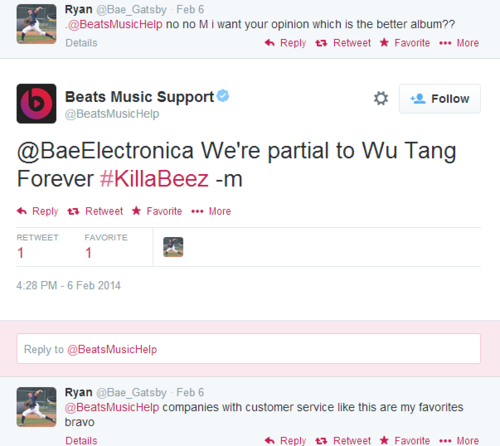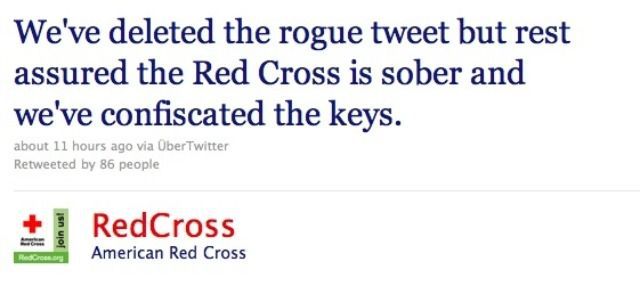If you work in social media, there’s a good chance you’ve had to deal with customer service issues a few times in your career. Maybe you’re a one-person team. Maybe you work for a major corporation that has an entire social support department. Either way, it’s a known fact that customers expect customer service. Whether you’re answering questions on your own or coordinating between departments, these 10 tips for stellar customer service will help you minimize mistakes and maximize customer appreciation.
I would know – I worked briefly at Beats Music around the time of their launch. While I was manning their social media channels, I got some very interesting customer service tweets – ranging from obnoxious to hilarious to downright absurd. Someone asked if Dr. Dre himself was handling the Beats Support Twitter channel. Here’s one of my finer moments.

1. Let the customer know you care
Using phrases like “we’re listening” and “we want to help” can be disarming when a customer is upset about something. Both on and offline, most people just want to be heard when they have a concern. It’s a perfectly normal human reaction in cases of conflict. Utilizing empathy can quickly dismantle a customer’s initial anger.
2. Answer publicly
This is essential protection for your company’s reputation. If your other customers see that you’re attending to customer questions and requests, they won’t assume that you ignore people.
3. Take the conversation private as soon as you can
That said, you don’t need every customer airing out their issues in a public place if you can prevent it. While public, like on a Facebook comment or tweet, ask your customer to please e-mail you or let them know you’ve sent them a direct message. This way you can give them the full scope of attention they require without letting the world in on your conversation.
4. Be transparent
Life happens. Things don’t always go as planned, and that’s understandable. Know that your customers are much more likely to forgive you if you’re upfront and timely about delivering the news. For example, when I worked for Covet Fashion, the reaction was always better if I was the one letting our players know that the game servers were down than to let them post on our Facebook page and think their complaints were going unheard. You may not be able to control what happens, but you often can control what the way you handle it.
5. Answer as quickly as possible
72% of people who complain on Twitter expect a response within an hour. 60% of respondents cited negative consequences to the brand if they didn’t receive timely Twitter responses.
Social media managers aren’t superhuman. They need to sleep, but the internet runs 24/7 in every time zone there is. It’s not uncommon to wake up to a barrage of incoming social messages, but do try to get to them as quickly as you can. At Beats, our team was staggered so that we could cover as many hours as possible during Pacific Standard Time waking hours.
6. Make sure your messages are aligned
If you’re working for a larger company, there may be several people or departments you need to coordinate announcements and communications with. It’s better to say nothing at all than to deliver incorrect or inconsistent information. If your Facebook page says that product shipments are delayed but your Twitter proclaims that all shipments are due to arrive on time, you’re burying yourself into a deeper hole. And as Kanye West knows, the internet is written in ink.
7. Apologize when you need to
Again, social media managers aren’t superhuman. Neither are engineers, or product developers. If a company has made a serious internal mistake, reference #4 and err on the side of transparency. The worst thing you can do is pretend nothing is wrong.
8. Use humor when appropriate
Humor isn’t always appropriate – if there’s a huge national disaster or tragedy, it’s usually better to stay solemn or silent.

If it’s something lighter, humor can be a wonderful disarming tool. The American Red Cross would know.
9. Learn from your mistakes
There’s a learning curve to everything, and nobody’s perfect. Customers can be mean on social media, due to the anonymity that comes with communicating through a technological buffer. They can also egg each other on when they share a common issue. If you have the bandwith, it can be helpful to keep a best practices guide to dealing with certain issues for future reference.
Social listening isn’t only valuable for proper communication, it can actually help to optimize your product or service and your processes. As one social media manager from Roku once said to me, you’re the canary in the mine.
It’s your job to let your team know when customers are alerting you to a problem or potential for improvement. Document comments and messages that pop up frequently. It could be the difference between a good and great experience for your customers.

Leave a Reply